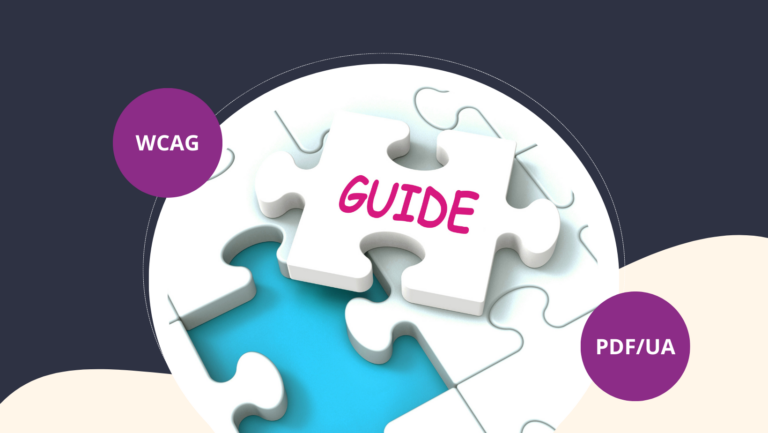The importance of accessibility of digital documents cannot be underestimated. In our country, as in many others, it is a legal obligation. This article reviews the law on PDF accessibility in France and why it is essential to promote an inclusive digital society. Let’s take a closer look at these legal requirements, best practices, and the importance of accessible PDFs.
Introduction to Laws on PDF Accessibility in France
Digital accessibility is not only a legal requirement but also a civic duty. Indeed, it promotes inclusion and ensures that all individuals, regardless of their abilities, can access and interact with digital content.
The first significant legislative measure dates back to 1975 with the Law on the Orientation of Disabled Persons.
However, a major law that laid the groundwork for digital accessibility, including PDF accessibility, was Law No. 2005-102 of February 11, 2005, for equal rights and opportunities, participation, and citizenship for people with disabilities.
- February 2005 Law on Equality and Non-Discrimination (Article 47 of the Law of February 11, 2005)
The online public communication services of the State, territorial collectivities, and dependent public institutions must be accessible to people with disabilities.
- October 2016 Law on the Digital Republic
Web accessibility also applies to administrative, public, and private companies delegated with a public service.
- Decree of July 24, 2019
The law extends the accessibility requirement to the private sector, particularly to companies generating an annual turnover of 250 million euros (generated in France).
Europe issued a regulation for all member countries in April 2019. This regulation must be transposed into national laws for implementation by 2025. In France, this transposition was completed on March 9, 2023.
This directive applies to a number of office documents placed on the market after June 28, 2025.
Indeed, it does not apply to the following content on websites and mobile applications published before June 28, 2025. Therefore, it will be applicable to those after this date.
- Law DADUE of March 9, 2023, on various provisions adapting European Union law and ordinances of September 6, 2023, and October 9, 2023.
- Designated control bodies
- Revised framework for monitoring accessibility obligations: from +10 employees and €2 million in revenue
- An increase in fines for non-compliance with accessibility obligations: up to €50,000 per site
- The Audiovisual and Digital Communication Regulatory Authority (ARCOM) is now responsible for identifying and establishing shortcomings, relying in particular on automated collection methods, issuing prior injunctions before sanctions.
- If a sanctioned violation persists for more than six months after the imposition of the initial sanction, a new sanction may be imposed (instead of one year previously).
- The decree No. 2023-778 of August 14, 2023, regarding the accessibility of people with disabilities to digital books and the software necessary for their use.
- Order No. 2023-859 of September 6, 2023, issued in implementation of the 1st of VII of Article 16 of Law No. 2023-171 of March 9, 2023, containing various provisions for adapting to the European Union in the fields of the economy, health, labor, transportation, and agriculture.
- Decree No. 2023-931 of October 9, 2023, regarding the accessibility of products and services on public administration websites for people with disabilities. This text regulates various products, excluding self-service terminals, and different services, including banking services, essential financial services, public transportation services, telecommunications services, and audiovisual media services. This is in line with the implementation of the European Accessibility Act (EAA) by 2025.
Why comply with these laws? What are the consequences of non-compliance?
In case of non-compliance with accessibility obligations, establishments may be subject to administrative sanctions, such as fines or injunctions to comply.
By implementing robust accessibility policies such as PDF/UA, France is working towards creating a more inclusive society where everyone can easily access digital content.
Best Practices for Making PDFs Accessible in Compliance with French Accessibility Law
Adhering to best practices for PDF accessibility is essential to comply with French law and meet the diverse needs of users with disabilities. These practices revolve around addressing user requests and, in general, the quality of their processing.
Some of these best practices include creating accessible PDFs from the source document. Tools and techniques are also available to make PDFs accessible.
Understanding the legal requirements for PDF accessibility, as well as the tools and techniques available to comply with them. That’s the key takeaway. Moreover, viewing the accessibility of these documents as a key element to ensure inclusion and equality in our ever-evolving digital society. It is now our duty as citizens to stay informed about future developments and trends to continue capitalizing on accessible PDFs in France.
To ensure the compliance of your document, check out our Complete Checklist for Making Your PDF 100% Accessible.












